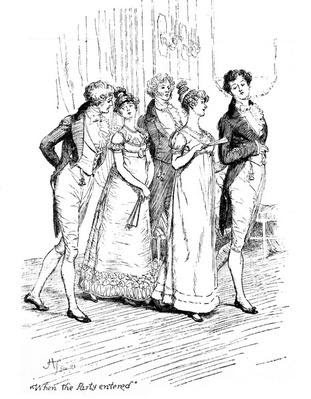Pride & Prejudice, ch. 4: Friends In High Places
Bingley is again the primary topic of conversation as we open, but fortunately we get to hear from two new characters: Jane and Lizzy (Elizabeth if you’re formal). Jane is really into him, noting that he combines “so much ease with such perfect good breeding.” Okay, Bingley is a good guy, we get it. It’s Elizabeth who adds that he’s easy on the eyes, which, given one of her more famous lines near the end of the book, comes off as ironic foreshadowing. At the same time, Lizzy’s love of the absurd (confirmed by her behavior in the previous chapter) gives this line a sardonic edge.
As it turns out, Lizzy is a Jingley shipper. “I give you leave to like him,” she assures Jane. “You have liked many a stupider person.” Note: “stupid” in this context relates to one’s personality, not their level of intelligence. (Remember Bingley accusing Darcy of “standing around in this stupid manner”? He was saying that Darcy looked bored, not dumb.) Lizzy is saying that Jane has crushed on some pretty unimpressive young men and that Bingley is a step up. Going by Jane’s gentle response, this has the cadence of a running joke between the two sisters (or proof that, on some level, Jane agrees with Lizzy).
The Bennet sisters agree on Bingley, but their opinions on his sisters are totally different. Jane’s all, they're super sweet once you get to know them. Lizzy thinks that Miss Bingley and Mrs. Hurst are superficial and shallow, a theory that is confirmed when the narrator gives us a run-down of their schooling and upbringing. See, the Bingleys are new money, as their dad built up the family fortune through trade. This is the first time a generation of Bingleys can afford to be genteel—not just live like it, but actually be of that class. Cf. Darcy the land-owner hanging out with them. They flaunt their newfound wealth by “spend[ing] more than they ought” and “[associating] with people of rank.” Austen wastes no time in giving the Bingley sisters (and by extension Mr. Hurst) every conceivable negative trait to the point of turning them into caricatures. And so, thanks to the narrator’s chiming in, we are led to believe whatever Lizzy’s observations lead her to conclude. Hm.
Also, minor note: Bingley doesn’t own Netherfield, but rents it. So he’s not strictly a land-owner, which disappoints his sisters, though they’re still happy to sponge off live with him. I know that Miss Bingley has little choice, but the Hursts could at least get a house of their own, right? (If they’re planning on having kids, do they think Bingley’s going to let them stay at his place?) Bingley chooses to rent partially because he feels he owes it to the next generation (i.e., his kids) to save up more money, but initially he wanted to outright purchase a house. “The easiness of his temper,” however, indicates that this decision could change—especially once we see that Bingley agreed to rent the house after only a half-hour tour. (Without even reading the Yelp reviews? Come on, Bingley, this is basic stuff.)
Discussions among fans about when Darcy met Bingley are few and far between, which is weird for two guys who are such opposites. But the paragraph detailing the dynamics of their friendship is downright adorable. There’s a lot of emphasis placed on how much Bingley likes and admires Darcy, which I didn’t really notice before, but really, how else would their friendship be so solid? Bingley, a person who tends to think well of everybody he comes across while also having a decent amount of common sense, is just about the only type of person who’d overlook Darcy’s spiky personality long enough to prove himself a friend. The “clever” Darcy, in turn, would be able to see how sincere Bingley really is. The real question is, why does Darcy let Bingley drag him into social situations that he clearly looks down on? (Unless the answer is because he likes having something to look down on, but I don’t think this fits Darcy’s character.)
As with Jane and Lizzy, the guys have different views of the Meryton assembly and, more generally, its populace. Bingley is happy with how he was treated and pleased with all he met; Darcy can’t be bothered to care about any of these people, none of whom went out of their way to show him “either attention or pleasure.” And it’s like, well, you get what you give, dude! If you’re looking down at a group of people while simultaneously wondering why they’re not trying to flatter and woo you, then let me politely suggest that you’re part of the problem. Not everybody is going to be as easy to like as Bingley is.
Next chapter: We meet one of the Bennets’ closest family friends, there’s yet more discussion about the ball, and the theme of the novel is articulated by perhaps the least likely character.



I've seen speculation that Darcy and Bingley met at university, and Darcy was maybe his mentor. Their friendship grew out of that, and now Darcy has become, besides a close, firm friend, dependent upon Bingley for social interaction. This seems to me an attractive hypothesis, and seems to fit the text quite well. It could account for Darcy's accompanying Bingley both to Netherfield and to the assembly. Darcy's foul mood could come from Bingley's precipitously moving to Netherfield without consulting him (really, there's not the slightest indication that Darcy even knew about Netherfield until Bingley returned to get guests for the assembly).
ReplyDelete